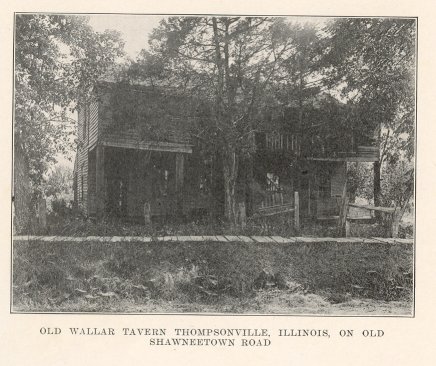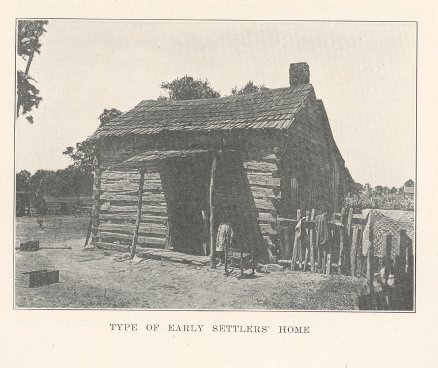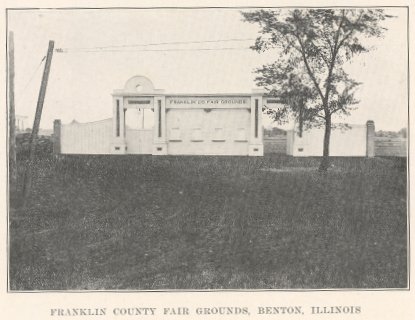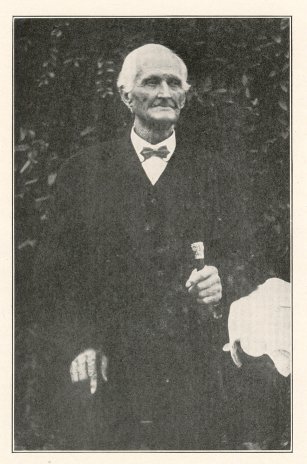
Pg 21
reported at 1228 and contained 171 families. At this time Franklin County included Williamson. The total population of all the counties to date was 34,610 or 5,390 less than the required number. So another hunt was started. A diligent search was made. An enumerator was stationed on the main public highway so as to catch the emigrants. It is said that some emigrants headed for Missouri were solicited by the enumerator to stop in Illinois, the enumerator agreeing to find a suitable location for the newcomer. The enumerator thus added several persons to his list. The second report made the county's population 1281 or 53 more. By all the counties taking the second census the count stood 40,258 which now met the requirement of Congress. So Illinois became a state Dec. 3, 1818.
The reports of the territorial legislation of 1817 and 1818 show that a Mr. N. Davis of Jackson offered the petition or measure as prepared by Mr. Cook, to organize Franklin County. A Mr. S. F. Gard, of Edwards County suggested the name "Franklin" in honor of Benjamin Franklin who, next to Washington, had done more probably to win independence than any other man of that time.
Delegates to the Constitutional Convention to be held at Kaskaskia were selected in the new counties. Thomas Roberts of Frankfort and Isham Harrison of the Mulkeytown Country were selected as the delegates. The slavery question was the main issue in framing the constitution.
Ohio had been admitted so the delegate of the convention used its constitution as a guide.
Jesse B. Thomas afterwards U. S. Senator was president of this convention. Rev. James Lemon of New De Sign, in Monroe County, was an active member who stood for free Illinois. His efforts doubtless caused the state to be free. Judge Jesse B. Thomas was from Kentucky and stood for slavery. It was Jesse B. Thomas who suggested the items in the Missouri Compromise of 1820. Slavery was defeated in
Pg 22
this convention yet indentured slavery was allowed in the Salt Works near Equality.
The constitution was never submitted to the people for ratification. The new constitution provided for the election of Governor and members of the legislature, Congress, Sheriff and County Commissioners. The office of County Judge, Prosecuting Attorney, Circuit Clerk, County Clerk, Justice of the Peace, Secretary of State, Treasurer, and Auditor, were filled by appointment of the governor.
Pg 23
The present territory of Franklin County was settled first in 1804, near Liberty Church, about 2� miles southeast of Thompsonville, by seven Jordan brothers, two Browning brothers, Wm. Barberry and a family by the name of Estes.
These families remained together for protection against the Indians and to help erect the houses. At that time the woods were full of hostile Indians and wild animals. The Indians had just emerged from a fierce battle among themselves, in which the tribe of Kaskaskias were defeated and almost annihilated. Mr. Barberry was killed and scalped by the Indians. This was the first white man killed in what is now Franklin County.
A few years after the first settlement had been made, Tecumseh, the great chief of the Shawnees, began planning for his great Indian confederacy to drive the white settlers out of the Mississippi Valley.
He made a trip through Southern Illinois to stir up the Indians against the white settlers.
Gov. Ninian Edwards of the Territory of Illinois, sent out word to every settlement to build block houses or forts as a means of protection against the Indians.
So the Jordan settlement built a strong fort on what is now the farm of Capt. John Ing, and another on the edge of Williamson County. The latter fort was called Francis Jordan's Fort. Later when the town of Frankfort was started they gave it the name of Francis Jordan's Fort. The name Jordan was omitted, calling the place Francis' Fort, or Frank's Fort and still later Frankfort. From about 1812 to 1818 there were more people in the settlements around Frankfort than any other settlement in the county.
Pg 24

county. About the same time came Jacob Phillips, the father of the Phillips family. There were five families in Northern Township in 1818 that have been there for 100 years. The Taylors, Webbs, Clarks, Phillips and Pages were there 100 years ago and you can find them there now. The Webbs are the most numerous.
John Browning was a hunter, and while on a hunting trip on the Big Muddy, discovered an ideal place for a settlement on a hill west of the river and later called Browning Hill. It was high ground, overlooking the surrounding country near the river and there was a fine spring of water at the foot of the hill.
He removed his family there about 1814, and soon other families settled near. The Jones, Harrisons, Hutsons and Kings formed a settlement. The settlement north of this place was long known as the Spring settlement on account of the numerous springs of water in the vicinity. John Browning built the old house that stands on the hill in 1814, and is probably the oldest house standing in the county. John Browning was a Baptist preacher and doubtless was the first preacher of hi� faith in the county. Through his efforts the Mt. Pleasant Baptist Church was founded in 1829, and is the oldest Baptist Church in Franklin County.
About the year of 1817, Rev. John Launis a Methodist minister came into the eastern part of the county. With him were the Dillons, Clampets, and Tates, Sullivan and Summers. This settlement became known later as the Launies-Dillon settlement. It was in this settlement that the first school house in the county was erected. Also the first Methodist Church was organized in this neighborhood and called Mt. Etna. The records show this church was organized about 1822, through the efforts of Rev. John Launis, Braxton Parrish and the Rev. Hancock, a Revolutionary soldier. The families that were charter members of this church were the Launis, Tates, Sullivans, Summers, and Clampets. This church will soon
Pg 26
have weathered the storms and vicissitudes, incident of the century, for nearly 100 years.
Almost in the center of Eastern Township is Knob Prairie. In this vicinity came the McLeans and the Aikens to settle about 1818. The McLeans and Aikens were all very close kin. Robert McLean the head of the McLean family was a brother-in-law of James Aiken who settled on Knob Hill, and a father-in-law of James Aiken who settled northwest of Aiken. These two James Aikens were distinguished by Knob Jimmie and Squire Jimmie. Into this settlement came the Summers and Sullivans, about this same time, and for a century they have been neighbors and friends. Today these same families may be found in great numbers in this settlement. There were four soldiers of the War of 1812 that lived in this community, Edward Sullivan, Alex, Thomas and Levi Summers, and five Black Hawk soldiers, Aiken McLean, Wilham Aiken, Walter S. Aiken, Noah and James Summers.

Pg 27
Isham Harrison, a relation to William Henry Harrison who was president, came with his family to the vicinity of Christopher in about 1814 or 1815. He first settled near the present city of Christopher. His son, Lemuel Harrison, has been a noted character in the early history of the county. The Mulkeys, Tinsleys, Harrisons, Greenwoods, and Kirkpatricks, were prominent families of the Tyrone Country west of Big Muddy.

Pg 28

Major William Mooneyham, Franklin County's grand old man has lived to see many wonderful changes in conditions. He was born December 4, 1819 and has been a resident of Franklin County 50 years, coming here October 30, 1838. The following year he was made captain of the militia. In 1854 he was elected sheriff, collecting the taxes by virtue of his office and collected the first school taxes levied. He was re-elected in 1858.
Major Mooneyham cast his first vote for James K. Polk in 1844. He is the oldest Mason in the county and was a member of the 81st Regiment, Illinois Infantry, of the Civil War for three years. He has seven grandsons in the service.
Major Mooneyham was 21 years of age when his grandparents, Shadrach Mooneyham and Harkless Ogle, who served in the Revolutionary War, entered into rest. Thus Franklin County has a citizen who has heard in part the story of the Revolution from the lips of those who were participants in the great struggle.
Pg 29
Of The 171 families in Franklin County at the time the state came into the Union and the county was organized in 1818, 90 percent of them were from the South.
The early settlers of the county who came from the South, brought with them, a hospitality and sociability, that could not be excelled anywhere in the U. S. The typical Yankee possessed many good traits of character but the genuine hospitality and sociability of the people of the South was a great inheritance of which Franklin County received in her early days.
Franklin County is indebted to her early settlers for the gentle, Christian spirit that had been a great factor in moulding the character of the founders of Franklin County.
Many pioneers brought their religion with them to Illinois as well as their personal property.
They looked upon religion as necessary as anything they could possess, that would be useful to them in the trying times in the new county. Braxton Parrish gave one half of his money for a bible to take with him to Illinois. The early settlers - men and women - of this county stood for something, as a rule, they were genuine people, all wool and a yard wide. They were simon pure, not adulterated with deceit, hypocrisy or shame.
Quoting from the writings of Hon. Q. E. Browning, a descendant of one of the oldest families in the county, his tribute to the character of the early pioneers are here given:
These early men were strong of limb, stout of heart and firm of purpose.
Their environment necessarily made them intense and rugged in all things. On the other hand their faith in the Divinity and His promise was absolute.
Pg 30
Society had not yet become so intoxicated with the spirit of commercialism. The amhitions of these men were to Be rather than to Have.
They were not distraught with the strange delusion which leads us to be proud of what we have, whereas in fact we have only borrowed from the common store. They would not forego the finer, higher, ennobling pleasure of whispering hope to the faint and discouraged, or of extending the hand of help to the fallen brother, for the fawning and cheap applause of the frivolous accord of the heaper of gold.
The pioneer women were the counterparts of these stalwart men. In storms they were oaks, in sunshine, flowers.
They loved the birds and their songs, but they did not envy them their plumage. They could enjoy a landscape without owning the land. Fads, frills and foibles did not interest, much less, enthrall them.
They preferred that their souls should be beautiful rather than their bodies. The supreme interest was in their homes, and their highest happiness was in motherhood. The childless wife was an object of pity or contempt.
Divorces were unknown. Employment, the infallible antidote for incompatibility and domestic ennui was always present. The night was never dark enough, or starless enough, the storm was never wild enough or fierce enough, the lurid arrows of ill fortune never flew thick enough or fast enough to drive their women from their husbands sides. Joy, peace, and contentment and affection encompassed and enveloped their homes.
To be the descendants of such progenitors is a priceless heritage. Let us emulate their virtue and revere their memories. To paraphraze Coleridge:
"Their bones are dust, Their guns are rust, Their souls are with the Saints, we trust."
The dominant element of our population today is the